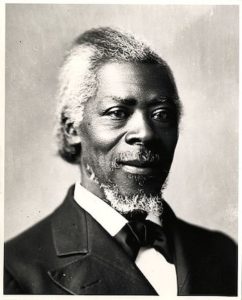
William Lambert
*This date in 1817 is celebrated as the birth date of William Lambert, a Black abolitionist and businessman.
William Lambert was born free in Trenton, New Jersey. At least one of his parents was free at his birth. Crucial to his later success, Lambert was taken under the wing of a Quaker schoolmaster. This schoolmaster and abolitionist, Abner Hunt Francis, provided Lambert with valuable formal classroom education and to the movement at a young age.
In the 1830s, the pair found themselves in Buffalo, New York, rallying for the abolition movement, where his mentor worked with the local abolitionist. From there, Lambert would start making his way in the world by traveling the Great Lakes region and Detroit by hiring out as a cabin boy on commercial steamers. Around 1840, Lambert settled permanently in Detroit and, though only in his early 20s, involved himself in the local business and anti-slavery communities. Lambert's first steady job in Detroit was in a tailor shop and the garments industry. It would be in that community and that shop that he would first meet George DeBaptiste. He and DeBaptiste would become close associates within Detroit's local chapter of the Underground Railroad.
Additionally, Lambert eventually owned a successful tailoring and dry-cleaning business. Upon establishing himself in Detroit, Lambert was soon involved in local civil rights and anti-slavery groups. He had the skills and inspiration to become an organizer in those groups; one of them was the Detroit Anti-slavery Society, with his formal education and childhood in the company of abolitionists Abner Francis, Henry Highland Garnet, and even Fredrick Douglass. By 1842, Lambert had reached the foreground in local Black politics when he and two other men formed the Colored Vigilant Committee, which would lobby for the rights and freedom of Blacks in Michigan. Many of the petitions and statements produced by the committee were drafted and delivered by Lambert.
One of his earliest platforms was suffrage, and notably, it appears in some sources that he not only advocated for Black men's right to vote but also that all men should have the right to vote regardless of class or race. Lambert had gained a platform with his eloquent work in local politics, but it would be in 1847 that he would gain notoriety on a more national level. By this time, Lambert had become a conductor in the Underground Railroad, and at least one of his businesses served as a safe house. Then, in 1847, a fugitive slave named Robert Cromwell tried to escape to Windsor, Canada, via Detroit and Lambert's segment of the Underground Railroad. Cromwell was being closely pursued by his owner, John Dun, but Lambert's influence in Detroit by that point was enough to jail the Dun long enough for Cromwell to escape into Canada. Later, while commenting on the success of his lawyers at lobbying for Dun's detention, Lambert remarked that "our law point was bad but were numerous and resolute."
The grounds for Dun's imprisonment were indeed tenuous, and he was later released, but it would be too late to recapture Cromwell. However, the audaciousness of Lambert's tactics in aiding Cromwell and, more importantly, their success would cause aftershocks that contributed to the passing of the Fugitive Slave Act of 1850. With a formal education and a background in the anti-slavery movement from a young age, he would become a significant figure in Detroit's local Black community and the city for over 50 years. For the last few months of Lambert's life, he appeared to be suffering some form of neurodegeneration or "incipient softening of the brain," as his doctor referred to it at the time, possibly brought about by old age. In those last few months, Lambert started having difficulties being aware of his surroundings, with one anecdote from the obituary noting how he had been found one morning at an old place of business, having wandered from his home in the middle of the night.
On the night of April 28, 1890, after the rest of his family had retired to their beds, William Lambert committed suicide by hanging in the woodshed on his property. By the time of this death, his successes in business would leave behind an estate worth approximately $24,800,000 (2018 USD) when adjustments for inflation and purchasing power parity since 1890. He was buried at Elm Wood Cemetery on April 30, 1890. Many of Detroit's other abolitionists were laid to rest, including George DeBaptiste, Lambert's longtime friend and college in the Underground Railroad.